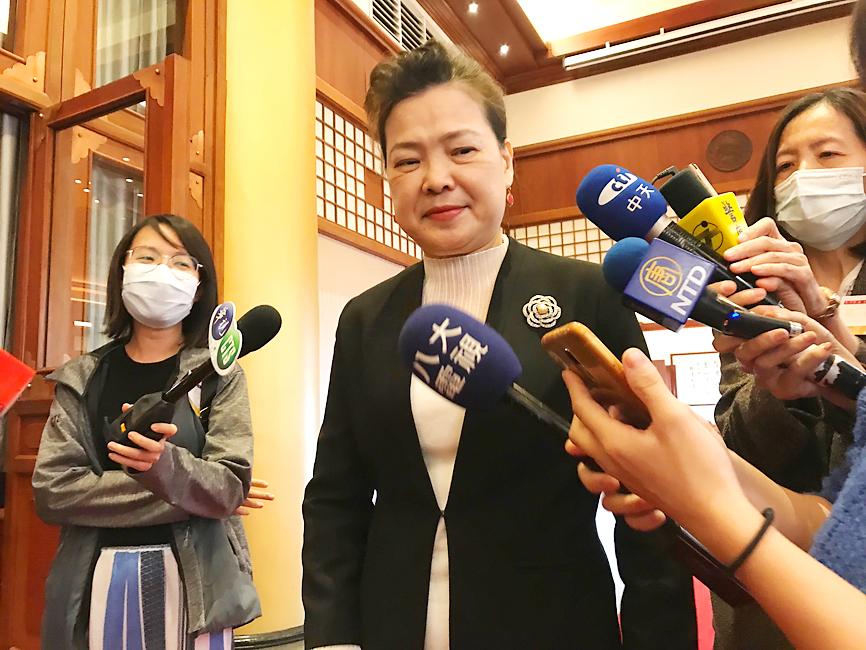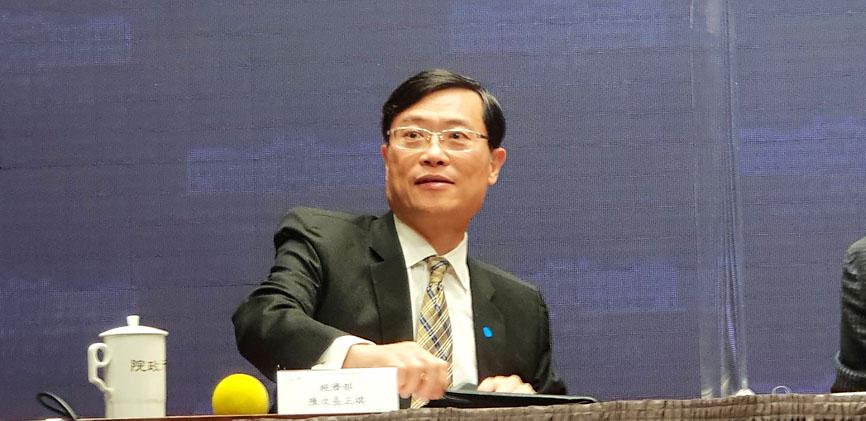Taiwan and the US are to hold talks on “strategic economic cooperation” in Washington on Friday next week, the Ministry of Economic Affairs (MOEA) and the Ministry of Foreign Affairs announced in separate statements yesterday.
US Assistant Secretary of State for East Asian and Pacific Affairs David Stilwell on Aug. 31 announced the establishment of the Taiwan-US Economic and Commercial Dialogue — which has since been renamed the Taiwan-US Economic Prosperity Partnership Dialogue — after President Tsai Ing-wen (蔡英文) on Aug. 28 promised to ease restrictions on imports of US cattle more than 30 months old and US pork containing ractopamine.
US Secretary of State Mike Pompeo announced the date of the talks at a news briefing in Washington on Tuesday, saying: “The dialogue signifies that our economic relationship with Taiwan, a vibrant democracy and reliable partner, is strong and growing.”

Photo: Lee Ya-wen, Taipei Times
The first dialogue would be “online/offline,” with Deputy Minister of Economic Affairs Chen Chern-chyi (陳正祺) leading a small delegation to the US, while Minister of Economic Affairs Wang Mei-hua (王美花), Minister without Portfolio John Deng (鄧振中) and Minister of Science and Technology Wu Tsung-tsong (吳政忠) would join the talks from Taipei via video conference.
The US delegation would be headed by US Under Secretary of State for Economic Growth, Energy and the Environment Keith Krach, who visited Taipei in September.
US-Taiwan relations are “going in a very good direction” and the MOEA is working to “expedite progress,” Wang said.

Photo: Lee Hsin-fang, Taipei Times
“We will be talking about economic cooperation in the fields of medicine, technology, supply chains and energy,” she said.
“We can see by the breadth of the topics that just like US Secretary of State Mike Pompeo said, the Taiwan-US relationship is strong and growing,” Wang said. “We are happy to be able to seize the moment and push ahead with talks.”
As the talks would be held within the purview of the US Department of State, specific trade issues, such as a bilateral trade agreement, would not be addressed, she said.
Asked by reporters whether the issue of US pork imports would be revisited, Wang said that it was important to “follow through on President Tsai Ing-wen’s commitment to lift the ban.”
“The ban on pork containing ractopamine was a long-term problem we finally addressed. Now that the president made a promise [to ease the ban], we must carry it through,” Wang said.
During a meeting with industrial representatives in Taipei yesterday, Tsai said that the dialogue demonstrates the progress in Taiwan-US relations and heralds an opportunity for local industries.
With closer partnerships, Taiwanese companies would surely become more competitive on the global stage, she said.
American Institute in Taiwan (AIT) Director Brent Christensen would also join the dialogue from Taipei via video conference, the AIT said in a news release, adding that Chen would be joined in Washington by Representative to the US Hsiao Bi-khim (蕭美琴).
Cooperation related to 5G security, semiconductors, infrastructure development, investment project reviews and women’s economic empowerment, as well as scientific and technological projects would be discussed, the statement said.
In other developments, Wang told reporters that “economic bubbles” for business travelers to Taiwan are “necessary for the Taiwanese economy.”
“Face-to-face communication is still irreplaceable for serious investments and purchasing decisions,” Wang said. “We are pleased the first case went through — there are more in the pipeline.”
The MOEA on Tuesday announced that the Central Epidemic Command Center had approved a request for several representatives of a US electronics company to visit Taiwan for three days under economic bubble rules that exempt them from quarantine procedures.

The CIA has a message for Chinese government officials worried about their place in Chinese President Xi Jinping’s (習近平) government: Come work with us. The agency released two Mandarin-language videos on social media on Thursday inviting disgruntled officials to contact the CIA. The recruitment videos posted on YouTube and X racked up more than 5 million views combined in their first day. The outreach comes as CIA Director John Ratcliffe has vowed to boost the agency’s use of intelligence from human sources and its focus on China, which has recently targeted US officials with its own espionage operations. The videos are “aimed at

STEADFAST FRIEND: The bills encourage increased Taiwan-US engagement and address China’s distortion of UN Resolution 2758 to isolate Taiwan internationally The Presidential Office yesterday thanked the US House of Representatives for unanimously passing two Taiwan-related bills highlighting its solid support for Taiwan’s democracy and global participation, and for deepening bilateral relations. One of the bills, the Taiwan Assurance Implementation Act, requires the US Department of State to periodically review its guidelines for engagement with Taiwan, and report to the US Congress on the guidelines and plans to lift self-imposed limitations on US-Taiwan engagement. The other bill is the Taiwan International Solidarity Act, which clarifies that UN Resolution 2758 does not address the issue of the representation of Taiwan or its people in

SHIFT: Taiwan’s better-than-expected first-quarter GDP and signs of weakness in the US have driven global capital back to emerging markets, the central bank head said The central bank yesterday blamed market speculation for the steep rise in the local currency, and urged exporters and financial institutions to stay calm and stop panic sell-offs to avoid hurting their own profitability. The nation’s top monetary policymaker said that it would step in, if necessary, to maintain order and stability in the foreign exchange market. The remarks came as the NT dollar yesterday closed up NT$0.919 to NT$30.145 against the US dollar in Taipei trading, after rising as high as NT$29.59 in intraday trading. The local currency has surged 5.85 percent against the greenback over the past two sessions, central

US Indo-Pacific Commander Admiral Samuel Paparo on Friday expressed concern over the rate at which China is diversifying its military exercises, the Financial Times (FT) reported on Saturday. “The rates of change on the depth and breadth of their exercises is the one non-linear effect that I’ve seen in the last year that wakes me up at night or keeps me up at night,” Paparo was quoted by FT as saying while attending the annual Sedona Forum at the McCain Institute in Arizona. Paparo also expressed concern over the speed with which China was expanding its military. While the US